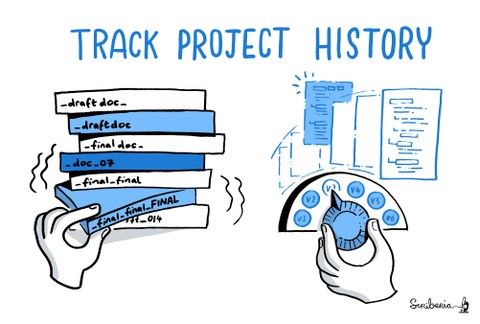28.01.2023
Versionierung: Einblick in die Lebensgeschichte von Forschungsdaten und Forschungssoftware
Änderungen an textbasierten Forschungsdaten oder dem Analyseskript sind schnell gemacht. Vor allem, wenn man in einem größeren Team arbeitet. Um hierbei die Nachvollziehbarkeit der Forschung aufrechtzuerhalten, bedarf es einer Dokumentation der Änderungen. Andernfalls können bereits ganz praktische und nur allzu häufige Fragen im Forschungsalltag zu Schwierigkeiten führen – ein paar Beispiele:
- Wie war der genaue Stand des Analyseskripts als wir die Daten vor drei Monaten ausgewertet haben?
- Welche Änderungen haben meine Kolleg:innen genau vorgenommen?
- Wie komme ich an den Teil des Dokuments, den ich letzte Woche aus Versehen gelöscht habe?
- Wann genau hat sich dieser Fehler in unser Skript eingeschlichen?
- Was genau bedeuten gleich noch mal die Namenszusätze der verschiedenen Dateiversionen?
In vielen Fällen schaffen manuell geführte Änderungsprotokolle zusammen mit dem systematischen Anlegen von Sicherungen Abhilfe. Ein solches Vorgehen ist bei all seiner Einfachheit jedoch auch fehleranfällig und erfordert ein hohes Maß an Bereitschaft.
Daher bietet sich die Verwendung eines automatischen Versionsverwaltungssystems (z.B. Git, Subversion, Mercurial) an. Diese Systeme haben ihren Ursprung oftmals in der Softwareentwicklung, lassen sich jedoch weitgehend unabhängig von den Inhalten und Dateiformaten einsetzen. Hierbei profitiert man von folgenden Funktionalitäten:
- Aufzeichnung von Änderungen an den Dateien (inkl. Zeitstempel und Person)
- Vergleich zwischen verschiedenen Versionen der Dateien
- Wiederherstellung älterer Versionen der Dateien
Zudem lassen sich parallele Entwicklungsstränge und die gemeinsame Arbeit mehrerer Personen an denselben Dateien mit ihrer Hilfe professionell verwalten.
Git gehört zu den am weitesten verbreiteten Versionsverwaltungssystemen. Die Dateien werden dabei oftmals zunächst in einem lokalen Repositorium verwaltet, bei dem es sich im Wesentlichen um einen einfachen Ordner handelt. Diese lokalen Repositorien können anschließend auch auf einem Netzlaufwerk oder webbasierten Plattformen wie GitHub oder GitLab einem Team zur Verfügung gestellt werden. Der Zugriff auf die Funktionalitäten der Versionsverwaltung erfolgt über die Kommandozeile des Betriebssystems, eine graphische Oberfläche oder entsprechenden Web-Interfaces.
Angehörige der TU Dresden haben die Möglichkeit die GitLab-Instanz der TU Chemnitz kostenlos zu nutzen.
Haben Sie weitere Fragen zu diesem Thema oder möchten Sie konkrete Inhalte vertiefen?
Gerne kommen wir mit Ihnen ins Gespräch. Kontaktieren Sie uns dazu per E-Mail über Kontaktstelle Forschungsdaten, buchen Sie sich einen Termin, besuchen Sie unsere wöchentliche Sprechstunde oder nutzen Sie unser Weiterbildungsangebot.

